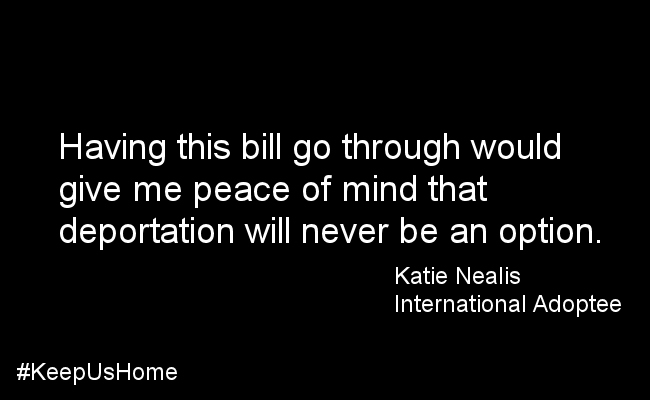Many outside the adoptee community are surprised when they learn that this country can and will deport international adoptees. Yet, that is exactly what could happen — and has already been happening — for an untold number of adult adoptees.
The US government reports that there have been approximately 250,000 international adoptions recorded in the past 15 years, most adopted before the age of 2. For most of the late twentieth century, the vast majority of these infants were adopted from South Korea; this trend began after the Korean War left many children orphaned. Today, China has overtaken Korea as the most popular country within which prospective parents seek to adopt: nearly one-third of international adoptions involve children born in China. Thus, America’s international adoptees are predominantly Asian American, and the political issues faced by this community deserve our attention and our advocacy.
Most Americans — including many prospective adoptive parents — assume that international adoptees acquire automatic US citizenship with the completion of adoption paperwork. That is simply untrue. The citizenship of international adoptees is dependent upon whether or not their American citizen parents have separately sponsored their petition for US citizenship, even after adoptees have already begun life in America.
Adoptees for whom this US citizenship was not applied for or received during childhood — either because of adoptive parental ignorance, abuse, or neglect, or because adoptees were placed into the foster care system — have limited mechanisms of recourse by the time they turn 18. Their parents may be unable or unwilling to sponsor their citizenship application. They are unable to self-sponsor a petition for citizenship. Consequently, many find themselves suddenly thrust into the role of undocumented Americans when they become adults. They find themselves unexpectedly criminalized by a country that once claimed to welcome them in as children.
For most adoptees, America is the only country they have ever known. Yet, like other undocumented Americans, these international adoptees lack the necessary paperwork to go to most colleges, obtain most employment, or even get a driver’s license in most states. When they come to the attention of United States immigration enforcement, they typically face deportation to the country of their birth, which they neither know nor had any choice in leaving. These adoptees — promised a new life when brought to this country as children — are treated upon entering adulthood as if they do not belong here.
Katie Nealis, an adult international adoptee, spoke to me about her experiences.
I already consider myself an American and have as long as I can remember. It was a blow to find out I wasn’t a citizen. I know this tears up my parents to know that they forgot this important step in my life.
Unfortunately, the cost of going through the process is my own and frankly, I haven’t had the means.
So, I lived in hiding at the advice of an immigration lawyer who told me that to come forward would be inviting scrutiny. All the years I had acted as citizens do — claiming citizenship on forms and voting — could very well get me deported. I’m sure there are many that probably would call me a criminal and until this loophole is fixed I guess they would be correct.
Katie should not be treated like a criminal simply because her parents forgot to apply for her citizenship documentation; but that is exactly how our current legal system treats some of its international adoptees.
If by now you’ve read all this and decided that this situation is as illogical as it is unfair, you are not alone. In 2000, advocates lobbied for and successfully passed the Child Citizenship Act (CCA), which corrected this problem for foreign-born adoptees who were still children at the time of its passage by granting them automatic citizenship. But, the CCA included a senseless age restriction that excluded the many international adoptees who — like Katie — were born before 1982. Although Katie now has her permanent residency, there are many adult adoptees who are still currently living in the United States without documentation.
For the last several years, adoptee advocates such as Gazillion Strong have been working tirelessly in conjunction with such groups as Adoptee Solidarity Korea – LA to correct this lasting legal problem. Today, they announced a major victory in their efforts: S.2275 is a new bill (also called the Adoptee Citizenship Act) introduced to the US Senate on Tuesday that would grant retroactive citizenship to all adult international adoptees.
The bill is the culmination of Gazillion Strong’s advocacy efforts, and is a bipartisan bill co-sponsored by Senators Amy Klobuchar (D-MN), Jeff Merkley (D-OR) and Dan Coats (R-IN). Not only would it provide US citizenship to the countless adult adoptees currently living without documentation in America, but it would provide a clearer pathway to citizenship for all child international adoptees that would protect them from future deportation.
Katie says:
Having this bill go through would give me peace of mind that as an adoptee deportation will never be an option.
The Senate will be voting on this bill in the coming weeks, and a similar House version of the bill is planned.
Despite its bipartisan support, however, S.2275 still needs our community’s help. Gazillion Strong has partnered with 18MillionRising on the latest effort in the grassroots #KeepUsHome campaign to tell Congress why we need to pass this Senate bill. Without our strong support, this bill might fail.
Act Now! Our adoptee community is asking for us to take just a few minutes to help show our broad support for this proposed legislation. Please take a minute to go to the S.2275 Adoptee Citizenship Act 2015 #KeepUsHome campaign website for more details on how to participate.

